'The richness of Buddhism makes it possible for us to create these stories and to interpret them.'
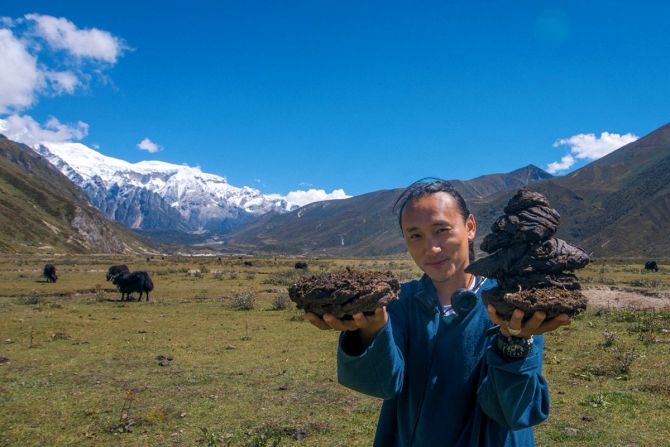
Pawo Choyning Dorji learned film-making by observing and working with his spiritual guru, Khyentse Norbu.
A Bhutanese monk, Norbu has directed films like The Cup, Vera: A Blessing with Shahana Goswami and dancer Geeta Chandran, and the Nepal-set Looking for a Lady with Fangs and a Moustache.
Dorji's first film, Lunana: A Yak in the Classroom is Bhutan's second entry in the Oscars. In February, it received a nomination in the Best International Film category.
Lunana is competing with four films celebrated at film festivals: Drive My Car (Japan), Flee (Denmark), The Hand of God (Italy) and The Worst Person in the World (Norway).
Lunana traces the journey of a young Bhutanese singer Ugyen Dorji (Sherab Dorji), who is sent to teach in the Lunana Valley, a remote high-altitude school. Lunana can only be accessed by an eight-day trek.
There, in a pristine and pure land untouched by modern civilisation, Dorji meets a wonderful group of people, including a confident young girl, 12-year-old Pem Zam playing herself in the film. Pem's performance has charmed critics in the West.
Lunana is one of the five South Asian films nominated for Oscars in the foreign language category, like Mother India, Salaam Bombay and Lagaan (all from India) and Himalaya (Nepal).
Dorji discusses his film with Rediff.com Senior Contributor Aseem Chhabra and says, "The reason why I wanted to go to this place so badly was because of the innocence. I wanted the purity. How is it to live in a place that does not have electricity or a telephone connection, where people do not have any concept of what the world is beyond the mountains?"
The first of a fascinating two-part interview:
Pawo, congratulations to you. This is great news not just for Bhutan, but for all of South Asia. You are in Taiwan now. What took you there?
My wife is American-Taiwanese and she lives here with our two kids.
I usually split my time between India, Bhutan and Taiwan.
When the pandemic struck, I rushed here because I realised everyone was getting stranded wherever they were.
So I would rather get stuck with my kids.
Now I have been here for the last year and a half, which is very unusual because I am usually living off my suitcase, traveling every few months.
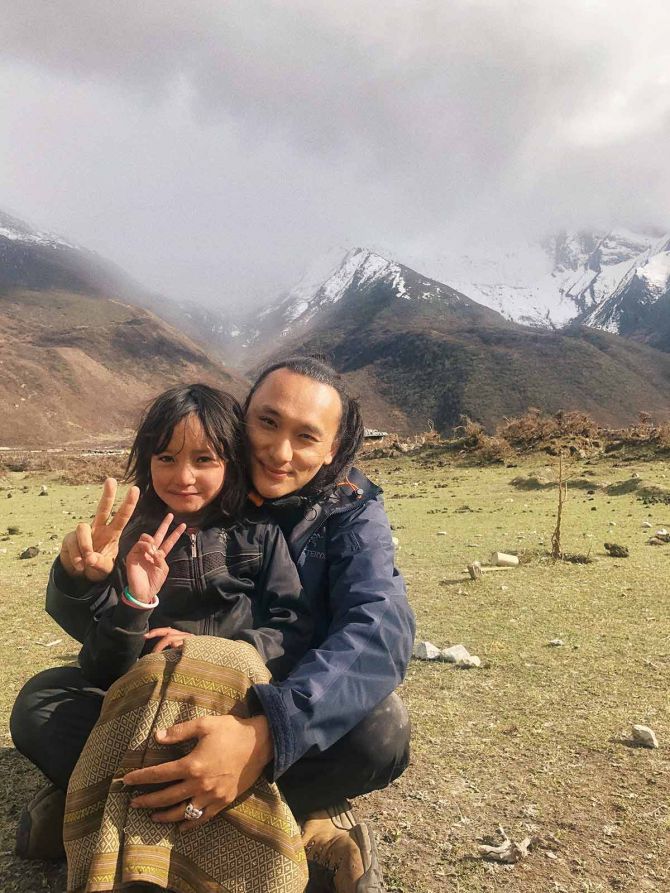
The other day when we were chatting on Facebook, you told me that you spend part of the time in Bir in Himachal Pradesh. I know it's beautiful out there, but what brings you to India?
You know, in Bhutan, we are all Buddhist. We have this guru-disciple phenomenon going on.
My Guruji is based in Himachal Pradesh. For me, my spiritual life comes before everything else, even before my film-making life.
So I gave up everything and moved to India to be with my teacher. That's where I discovered film-making.
If you had met me, maybe like 15 years ago, you wouldn't have believed that I would become a film-maker.
I was studying political science. I wanted to become a diplomat like my father.
But then I gave up everything to study Buddhism.
While studying Buddhism, I fell in love with storytelling.
I became a photographer, then a writer. I have transitioned into a filmmaker now.
My teacher Khyentse Norbu is known as the Lama who makes films. His first film, The Cup, was shot in Himachal.
It was the first Bhutanese film to be submitted to the Oscars. My Oscar journey has been so fulfilling because I am following my teacher's footsteps.
He has played such a vital role and guided me every step of the way.
I interviewed Khyentse Norbu when his film Vara: A Blessing was shown at the Tribeca Film Festival.
I find it fascinating that he spends part of the year meditating. He told me that sometimes he is not able to make it to some of his film promotions.
Is that the life you have also chosen? You spend time meditating and cutting yourself off from the rest of world?
Spiritual practice is very important for me.
Everyday, a certain amount of my time is spent on meditation.
Sometimes in a year, I will go away for a month or something.
But spending time with him is where I got my introduction to filmmaking.
Helping him with his filmmaking was my film school.
Being his assistant, I had to be involved in scriptwriting, casting, location scouting, pre-production, production design, directing, and then post-production.
On his previous film Hema Hema: Sing Me a Song While I Wait, I was his producer, although I almost worked like an assistant director.
Once the film was finished, he went off into his monastery, and I was left to do the promotion.
It was so fascinating.
That's what drew me into thinking, this is what I want to do with my career as well.
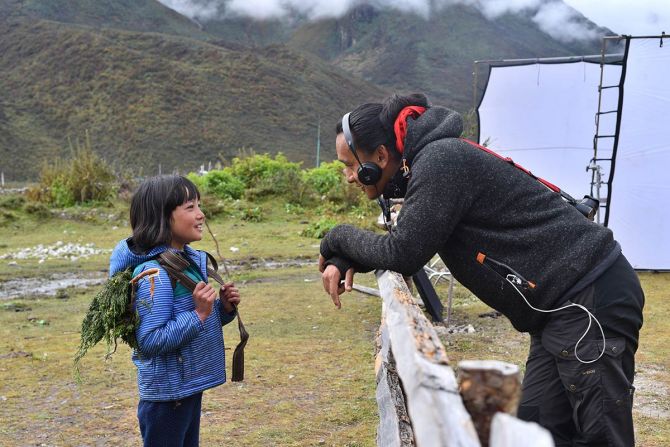
But Khyentse Norbu and you, how do you bring your beliefs in Buddhism in line with film-making? How is this aligned together?
Buddhism is such a rich tradition.
I don't call Buddhism a religion.
If you want to believe in a religion, you have to believe in a God, the almighty creator.
In Buddhism, we don't have that.
We believe that even the idea of God is impermanent, everything is impermanent.
So in a way, because of the richness of Buddhism, it can be interpreted in so many different ways.
In the movie, Lunana: A Yak in the Classroom, the yak song is a good example of the Buddha's teaching.
It talks about karma, the circle of life, and the most important teaching of the Buddha, which is interdependence.
Everything in this world is interdependent on one another. The yak depends on the herder and the herder depends on the yak. Everything is a circle.
The richness of Buddhism makes it possible for us to create these stories and to interpret them. It's not like, 'oh, if you are a Buddhist, you have to sit cross legged and meditate.'
But what you have to remember Buddhism came to us from India.
I know that. I have studied a lot about Buddhism, and I have been to some of the Buddhist sites. But it's beautiful listening to you speak, how you have absorbed its ethos.
I want to come to the film. This is your first film. You picked a location, which is an eight-day trek. Had you been to the Lunana Valley before? Most film-makers do recce, then the casting. Take me from that point when you set out with all your equipment, and your crew on the mules.
If I want to tell a story about someone who wants to seek the urban life, I can look at the West.
How do I create a story line where we show the opposite?
That's what took me to Lunana.
When people talk about Bhutan, they wonder what are the different, remote places? I went specifically looking for a remote place.
I trekked one day away, and four days away.
And it's sad because no matter how deep you go, the reach of globalisation and urbanisation is so strong.
Then some people said you must go to Lunana.
At that time, not many people had been to Lunana. If you looked up Lunana on Google, there are hardly any images that you could see for reference. So in a way, this is where things magically and beautifully fell in place.
I wrote the script but I never realised how Lunana would be.
I just visualised this place.
I was like, 'Oh, it must be like this. I will have the girl sitting here and she's singing and there's a vast mountain in the front of a school.'
When I first went for my recce, it was so magical. Everything kind of fit into place as if it was meant to be.
That's when I met Pem Zam. She came to me and sang a song.
I said, 'Okay, I want to cast you', but then I realised her family situation. She had no mother and her father could barely stand up because he was drunk all the time.
When I work with non-professional actors for the different roles, I study them. I spend time with them, learn about their lives. Then I incorporate that into the script to make it easier for them.
When I was working with Pem Zam, I always told her, 'I am not asking you to be pretend to be someone else. I just want you to be yourself.'
Logistically, to make a film in Lunana was so difficult. We were in pre-production for almost a year-and-a-half.
I think that is unheard of for a small indie film.
For a year-and-a-half, we had an army of mules carrying things up from solar panels, batteries and chargers.
We were almost like a second village living there, so we had to bring rations.
As there was no refrigerator, we took up things that would last a long time, like dried vegetables, rice.
When the actual shoot was going to happen, there was no time for us to take 35 people up the mountain.
It was cheaper to airlift our crew members into Lunana because the risk of us walking up the mountain was too heavy.
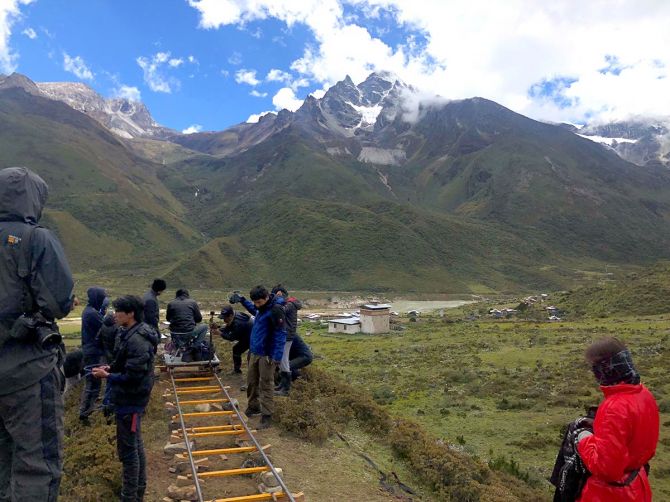
The article in The New York Times said your budget was only $300,000.
It was actually less. I think the time to make films in Bhutan is right now because everything can be done so cheaply.
But because we were shooting in a place like Lunana, even if we had money, there was nothing we could spend it on.
You had to pay your non-actors?
Of course, we paid all the actors. But by international standards, Bhutanese actors don't earn much.
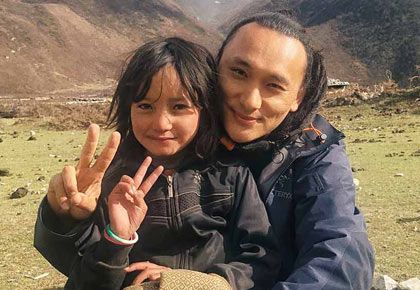








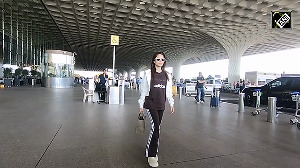
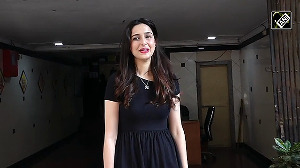
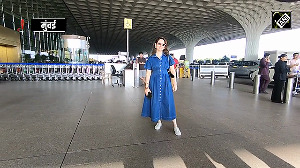
 © 2025
© 2025